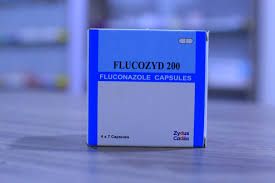Fluconazole 200mg, marketed by Cadila, is an antifungal medication used to treat a variety of fungal infections. This specific formulation is available in a pack of 28 capsules, making it suitable for extended treatment regimens.
Key Features
- Active Ingredient: Each capsule contains 200 mg of Fluconazole.
- Formulation: Hard gelatin capsules that are easy to swallow.
Indications
Fluconazole 200mg is indicated for:
- Vaginal Candidiasis: Effective for treating yeast infections caused by Candida species.
- Oropharyngeal and Esophageal Candidiasis: Treatment for thrush and infections of the throat.
- Cryptococcal Meningitis: Often prescribed for patients with compromised immune systems, such as those with HIV/AIDS.
- Invasive Candidiasis: Used for serious systemic infections caused by Candida.
- Prophylaxis: Prevents fungal infections in immunocompromised patients, particularly those undergoing chemotherapy or bone marrow transplants.
Dosage and Administration
- Recommended Dosage:
- For most cases of vaginal thrush, a single dose of 150 mg is typically sufficient.
- For oropharyngeal candidiasis, an initial dose of 200 mg may be followed by 100 mg daily.
- For cryptococcal meningitis, initial doses may be higher (e.g., 400 mg) followed by maintenance doses.
- Administration Instructions:
- Swallow the capsule whole with a glass of water.
- It can be taken with or without food.
Side Effects
Common side effects may include:
- Headache
- Nausea or vomiting
- Abdominal pain
- Diarrhea
- Rash
Serious side effects are rare but can include:
- Liver toxicity (elevated liver enzymes)
- Severe allergic reactions (e.g., anaphylaxis)
If any severe reactions occur, discontinue use immediately and seek medical attention.
Precautions
- Contraindications: Not suitable for individuals with known hypersensitivity to Fluconazole or other azole antifungals. Caution is advised for those with liver disease or a history of jaundice.
- Pregnancy and Breastfeeding: Consult a healthcare provider before use if pregnant or breastfeeding, as Fluconazole can be excreted in breast milk and may not be safe during pregnancy.
- Drug Interactions: Inform your doctor about any other medications you are taking to avoid potential interactions, especially with drugs that affect liver enzymes.

